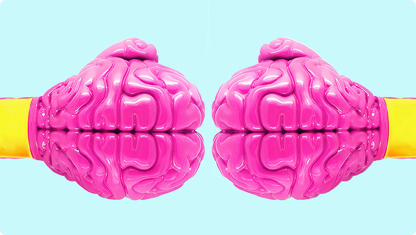
I have Executive Functions?
I hear this question a lot from families and individuals. Misinformation and misunderstanding can blur the impact of a diagnosis of "Executive Function Disorder", "Executive Dysfunction", "Deficiency in Executive Functions", or whatever term a doctor/clinician uses.
Many people confuse Executive Functions with the now-common term of ADHD, which it is not, although there are a lot of overlapping "symptoms".
New research and data appear almost daily, and it can overwhelm the most avid brain enthusiast. So, I will strive to build a simple foundation and gradually use that to lure you into the wonderful world of neuroscience.
What are Executive Functions?
Everybody has Executive Functions, so what the heck are they?
Basically, the Executive Functions are high-level cognitive functions that allow us to accomplish our goals, as well as skills that help us decide what to pay attention to and what we choose to do. Huh?
Simply put, Executive Functions are thinking skills and behavioral skills.
The thinking skills include: planning, organization, time-management, self-monitoring, and working memory.
The behavioral skills include: task-initiation, response inhibition, shifting/flexibility, emotional control, and goal-directed persistence.
How the Brain Influences Behavior
It's important to remember that everybody grows at different rates.
For example, some people's legs grow at a faster rate; for others, it could be kidneys, arms, feet, etc. Likewise, with the brain, some people simply take longer to "grow into their brain."
When the human brain develops, it grows from bottom to top, back to front. Research currently indicates that the frontal lobes, and specifically the prefrontal cortex, are among the last areas of the brain to develop. This area is the control center for Executive Functions, which tells all the other parts of the brain when and how to work in harmony…or not.
Frontal brain systems, such as the frontal cortex and prefrontal cortex, and connections with other areas of the brain (parietal, temporal, occipital lobes, for example) influence our Executive Functions.
The frontal lobes manage information and behavior by: 1) deciding what is worth paying attention to; 2) providing continuity and coherence to behavior over time; 3) adjusting affective and interpersonal behaviors within environmental constraints; 4) monitoring, judging, and adjusting.
The Prefrontal Lobe, the Brain's Stage Manager
A quick analogy…The prefrontal lobe is sort of like a stage manager in a theater performance, cuing actors on the stage. It moves a scene along if it drags or slows the pace if a scene gets too fast.
The manager will not allow actors to leave the stage before the end of the show. He or she constantly monitors the audience's reaction, and shapes future performances based on this feedback. If the manager lacks a system or leaves the theater, the show flops and closes down.
Now before you run out and have yourself, or your loved one, tested, remember that the brain can "rewire" itself based on thoughts and behaviors.
Unless there is permanent damage to the frontal lobes or other lobes, or disease affects the body, Executive Functions can be strengthened.
And if you live with a "crazy" teenager, the Executive Functions have only begun to develop. More on that next week!
The Brain Coach Blog is written by executive function coach Mary Turos. Based in Belair, MD, Mary is affectionately known as 'The Brain Coach." She helps people achieve harmony using strategies based in neuroscience.